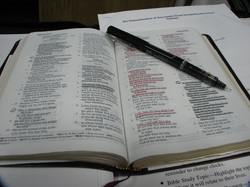Article IX. Curriculum

A. The school day and year correspond to the minimum
requirements set by the Texas State Board of Education for accredited public
schools.
** B. Bible is a required subject for all enrolled students and is carried out in addition to the instructional time necessary for other required academic course offerings.
C. The curricular and co-curricular activities are designed to develop each student academically, spiritually and physically.
D. The TEKS prescribed by the Texas State Board of Education for all courses in pre-kindergarten through twelfth grade are included in the curriculum. Course names and codes are consistent with those prescribed for public schools. The school offers the courses required for public schools in pre-kindergarten through eighth grade, but each school with grades nine through twelve may select to offer the sequence of courses required for the minimum, recommended, or distinguished diploma programs.
E. The school publishes and makes available printed material describing the curriculum offered and teaching methodologies.
** F. Schools that adopt self-contained curriculum developed by an outside entity must ensure these are from regionally accredited organizations. In turn, the school effectively quantifies student learning through the same measures used to validate other modes of instruction and makes appropriate adjustments to ensure comparable learning is taking place. Where such regionally accredited curriculum cannot reasonably be adopted, yet the school determines a self-contained curriculum is the best pedagogical mode of instruction, it must ensure the program is research-based, meets or exceeds all state learning objectives, and is supplemental to an overall curriculum design, taught by a qualified in-class teacher, using other instructional resources.
** G. The school practices free inquiry and allows students freedom of choice in determining truth. "Free inquiry" means that students are encouraged to seek truth. The teacher has the freedom to proclaim the Bible as truth. Students shall be free to form their own perceptions of truth without coercion.
H. Schools show evidence of integration of Bible concepts in all subject area curricula.
("**" indicates that additional notes are included in the attached Explanatory Addenda)
Passed and finalized March, 1995.
Revised, January, 1999.
Revised, March, 2012.
** B. Bible is a required subject for all enrolled students and is carried out in addition to the instructional time necessary for other required academic course offerings.
C. The curricular and co-curricular activities are designed to develop each student academically, spiritually and physically.
D. The TEKS prescribed by the Texas State Board of Education for all courses in pre-kindergarten through twelfth grade are included in the curriculum. Course names and codes are consistent with those prescribed for public schools. The school offers the courses required for public schools in pre-kindergarten through eighth grade, but each school with grades nine through twelve may select to offer the sequence of courses required for the minimum, recommended, or distinguished diploma programs.
E. The school publishes and makes available printed material describing the curriculum offered and teaching methodologies.
** F. Schools that adopt self-contained curriculum developed by an outside entity must ensure these are from regionally accredited organizations. In turn, the school effectively quantifies student learning through the same measures used to validate other modes of instruction and makes appropriate adjustments to ensure comparable learning is taking place. Where such regionally accredited curriculum cannot reasonably be adopted, yet the school determines a self-contained curriculum is the best pedagogical mode of instruction, it must ensure the program is research-based, meets or exceeds all state learning objectives, and is supplemental to an overall curriculum design, taught by a qualified in-class teacher, using other instructional resources.
** G. The school practices free inquiry and allows students freedom of choice in determining truth. "Free inquiry" means that students are encouraged to seek truth. The teacher has the freedom to proclaim the Bible as truth. Students shall be free to form their own perceptions of truth without coercion.
H. Schools show evidence of integration of Bible concepts in all subject area curricula.
("**" indicates that additional notes are included in the attached Explanatory Addenda)
Passed and finalized March, 1995.
Revised, January, 1999.
Revised, March, 2012.
